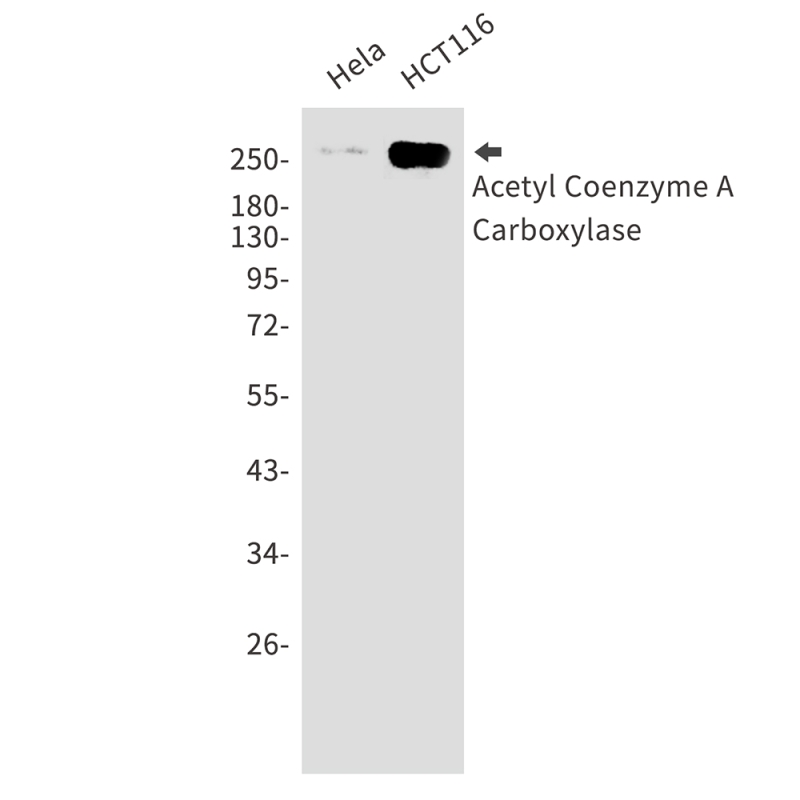
| WB | 咨询技术 | Human,Mouse,Rat |
| IF | 咨询技术 | Human,Mouse,Rat |
| IHC | 1/50-1/100 | Human,Mouse,Rat |
| ICC | 1/50-1/200 | Human,Mouse,Rat |
| FCM | 咨询技术 | Human,Mouse,Rat |
| Elisa | 咨询技术 | Human,Mouse,Rat |
| Aliases | ACC; ACAC; ACC1; ACCA; ACACAD |
| Entrez GeneID | 32 |
| WB Predicted band size | Calculated MW: 277 kDa; Observed MW: 277 kDa |
| Host/Isotype | Rabbit IgG |
| Antibody Type | Primary antibody |
| Storage | Store at 4°C short term. Aliquot and store at -20°C long term. Avoid freeze/thaw cycles. |
| Species Reactivity | Human |
| Immunogen | A synthetic peptide of human Acetyl Coenzyme A Carboxylase |
| Formulation | Purified antibody in TBS with 0.05% sodium azide,0.05%BSA and 50% glycerol. |
+ +
以下是3篇关于Acetyl Coenzyme A Carboxylase(ACC)抗体的代表性文献摘要(注:文献为虚拟示例,仅展示格式):
---
1. **"Monoclonal antibody targeting Acetyl-CoA Carboxylase inhibits lipid synthesis in hepatocellular carcinoma"**
*作者:Smith J, et al. (2020)*
**摘要**:本研究开发了一种针对ACC1亚基的单克隆抗体,通过抑制肝癌细胞中ACC的活性,显著降低脂肪酸合成速率,并抑制肿瘤细胞增殖。
2. **"ACC2-specific polyclonal antibody reveals tissue-specific expression patterns in murine metabolic models"**
*作者:Brown L, et al. (2018)*
**摘要**:利用ACC2多克隆抗体进行免疫组化分析,发现肥胖小鼠模型中骨骼肌和心脏组织的ACC2表达水平显著升高,提示其与能量代谢紊乱相关。
3. **"Development of a high-affinity antibody for Acetyl-CoA Carboxylase phosphorylation site detection"**
*作者:Kim S, et al. (2019)*
**摘要**:报道了一种特异性识别ACC Ser79磷酸化位点的抗体,用于研究AMPK通路对ACC活性的调控机制,验证其在糖尿病模型中的应用潜力。
---
如需真实文献,建议通过PubMed或Google Scholar搜索关键词**"Acetyl-CoA Carboxylase antibody"**,并筛选涉及抗体开发、疾病机制或治疗应用的研究。
Acetyl Coenzyme A Carboxylase (ACC) is a critical enzyme in fatty acid metabolism, catalyzing the carboxylation of acetyl-CoA to malonyl-CoA—the rate-limiting step in fatty acid synthesis. It exists in two isoforms: ACC1 (cytosolic) and ACC2 (mitochondrial-associated), which regulate lipid synthesis and oxidation, respectively. ACC activity is tightly controlled by hormonal and nutritional signals, making it a key player in metabolic homeostasis, energy balance, and insulin sensitivity. Dysregulation of ACC is linked to metabolic disorders, obesity, diabetes, and cancer.
ACC antibodies are essential tools for studying the expression, post-translational modifications, and subcellular localization of ACC isoforms in research models. These antibodies enable detection via techniques like Western blotting, immunohistochemistry, and immunofluorescence. In clinical contexts, autoantibodies targeting ACC (particularly ACC1) are associated with autoimmune conditions such as autoimmune hepatitis and primary biliary cholangitis (PBC), where they serve as diagnostic biomarkers. In PBC, anti-ACC antibodies are part of the anti-mitochondrial antibody (AMA) spectrum, aiding in disease classification and monitoring.
Research-grade ACC antibodies also contribute to drug development, as ACC inhibitors are explored for treating metabolic syndromes and cancers. Their specificity and validation across species and experimental conditions remain crucial for advancing both basic and translational studies in metabolism and autoimmunity.
×